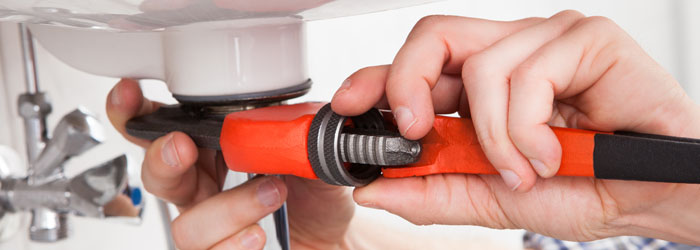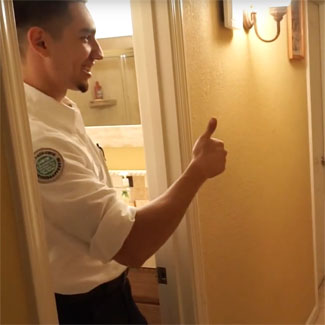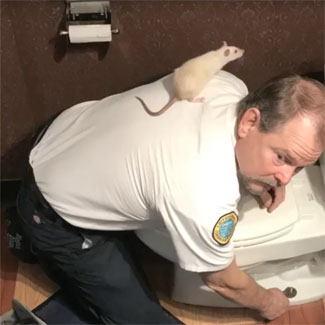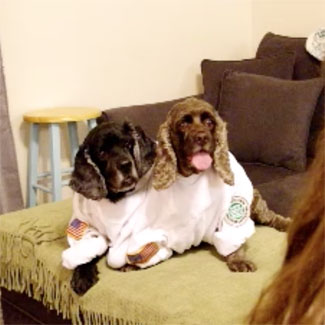Ups and Downs in the Life of a Plumber
 15 March 2017
15 March 2017 

Their Advice for Arizona Homeowners
Voting has closed in our First Annual Great Plumbing Bowl, featuring the three participants from Stampede Plumbing, now Day & Knight Plumbing who made it to the finals with their videos. Here’s an inside look at their working lives and their tips for homeowners:
Jairo Serrano
Serrano, born and raised in Tempe, became a plumber in part because his father is a plumber and started teaching him the trade when he was only 11. “I grew up around it,” he says, “and started working as a career when I was 19 or 20 years old. I like the fact that it’s a hands-on, everyday job and that I can go out on three or four calls a day in various areas of the Valley. I like being able to solve problems for homeowners.”
When he runs into difficult situations, he reminds himself to be “very, very patient.”
"If you’re buying a house, try to have your own plumbing inspection in addition to having a general home inspection." - Serrano
“You can’t expect a job to go in a certain way,” he says. “Sometimes a home was not built up to code and you have to redo everything in order to correct a problem. Sometimes you have to work late and get very dirty.”
In his video, he tried to portray typical problems he encounters and how happy it makes customers to have a plumber provide solutions. He and his friends used to make videos back when he was a teen-ager. “So when I heard about the contest, I wanted to give it a try.”
The most common problems Serrano runs into are issues with water heaters, probably because of how Arizona’s hard water eats away at pipes and metal. “I don’t think there’s anyone out there that hasn’t had a problem with a water heater.”
His main advice for Arizona homeowners: “If you’re buying a house, try to have your own plumbing inspection in addition to having a general home inspection. You want to check for flaws in the pipes, possible intrusion of roots. If you have a thorough plumbing inspection, you’ll have a higher assurance that the drains are good and the fixtures are working.”
Dave Kerrigan
Kerrigan, a native of Arizona and a military veteran, got into plumbing in 1973 “as a kid,” partly because his grandmother owned a thriving mobile home park. “When I turned 13 – during the summer months all through high school – she gave me a job learning to do repairs at the park, including plumbing alongside her favorite master plumber. Plumbing and construction isn't a job for me, it’s a calling,” he says. He has training and certifications in civil engineering and plumbing.
In his video, he features some of many animals he has met on the job, including the usual cats and dogs, but also the unusual, like a python. None were a problem, he says. “I believe animals have a primal instinct for survival and can sense when or where there is danger. … Conversely, they also sense people who are peaceful and calming, and it’s these people they are attracted to.”
"The smartest thing any homeowner can do for their plumbing system is to address the main offenders in city-supplied water." - Kerrigan
The toughest parts of his job, he says, are “working in attics in the summertime where high temperatures and lack of air movement create dangerous conditions requiring portable A/C units pumping in cold air to two-man teams, and working in or around sewage sump pits.”
These pits pump raw sewage from lower to higher elevations and can cover some distances to get to municipal pipe systems. “When these get backed up and need servicing, it can be a seriously foul, hazardous, dirty job,” he says.
His advice for Arizona homeowners: “The smartest thing any homeowner can do for their plumbing system is to address the main offenders in city-supplied water: sediment; chemicals such as chlorine and trihalomethanes (a byproduct of chlorination); and calcium and magnesium (common in hard water). The best way to minimize the damage they cause is through water treatment and regular maintenance such as flushing and descaling water heaters.”
Joseph Macias
Macias, originally from Redlands, Calif., has also lived in New Hampshire and Idaho. Besides working for Stampede Plumbing, he has also worked for his brother who was a plumber.
“I like the fact that there’s something new to do every day, and I like working with my hands,” Macias says. “I like making customers happy by putting in a new water heater or a new faucet.”
"Know where your water shutoff valves are and turn off the water when you go away for a week or two." - Macias
The star of his video is his own black male cocker spaniel who “repairs” some plumbing problems, including replacing a showerhead. He gets some help from Macias, of course. Macias’ brown female cocker spaniel makes a cameo appearance, too, but she was a bit fussy during filming and declined to take an active role in the video.
“I’m always happy to see a dog or a cat when I’m out on the job,” Macias says. “I tell homeowners, ‘You don’t have to put them away somewhere. I prefer them to be there.”
The most difficult situations that Macias has encountered involve replacing sewage sump pumps that are on the fritz. “When they break, they’re very heavy to pull out, and the smell can be difficult.” The hard water conditions in Arizona have really surprised him: “It’s unheard of in New Hampshire.”
Because of the hard water and the leaks that it can cause, his advice to homeowners is: “Know where your water shutoff valves are and turn off the water when you go away for a week or two.”
Macias also recommends that homeowners buy water softeners and filtration systems. “It might cost a lot to install a good system, but that will only be a fraction of what you might have to pay to repair damage if your home is flooded due to a leak.”
###
Photography Credit:
- Jairo Serrano
- Dave Kerrigan
- Joseph Macias
RELATED CONTENT:
- Finalists: The 2017 Great Plumbing Bowl
- See all the Entries: View Play List on YouTubePlay List on YouTube
- Plumbing Tips of the Month
Print this page
recent post
- Duck, Duck, Duct! How Often Should Ductwork Be Cleaned?
- Vinyl vs. Fiberglass Windows: Which Is The Better Choice Of Replacement Window?
- We May Be The Grand Canyon State, But The Rocky Mountains Are Important For Arizona
- Welcome to Arizona! Things A Newbie to Arizona Should Know
- The Pros & Cons of Buying A Flipped House
- Getting In On The Ground Floor
- Why It’s More Critical Than Ever To Get Your AC Serviced Before Summer
- The Reality of Remodeling
- What To Look For When Comparing Your Roofing Quotes
- What To Expect When Buying New Windows & Doors
